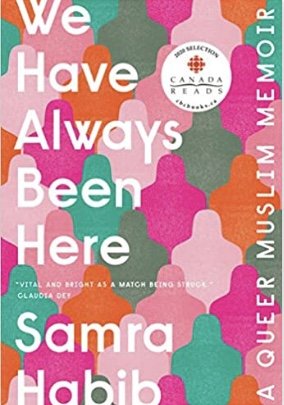We Have Always Been Here by Samra Habib (Viking, Penguin Random House Canada)
Samra Habib’s freedom becomes curtailed from the time she turns four. Left alone with a friend of her father’s while her mother runs an errand, she is sexually assaulted by the man who is supposed to protect her. Although she doesn’t say if the molester suffered any repercussions, she writes “I lost my right to be a child.” While her friends play without adult scrutiny, she has a constant chaperone, a nanny who monitors her whenever she leaves the house.
Other losses lie ahead of her. Her family belongs to one of Islam’s seventy-three sects, the one that is considered heretical. The Ahmadiyya believe in a Messiah who will succeed the Prophet Muhammed, a successor to Christ who will bring about a peaceful triumph of Islam, uniting it with other religions. This is disputed by other sects who refuse to acknowledge the Ahmadi as followers of Islam, often violently. Habib learns to keep her religion a secret but not even discretion allows peace. When her father’s life becomes endangered, he moves his family to Canada.
Fiercely homesick for Pakistan, Habib has that loss compounded by the role reversal that afflicts the children of immigrants. She becomes an English tutor to her parents and when her mother struggles with her efforts to gain a high school diploma, Habib frequently does her parent’s homework.
Assimilation is difficult but slowly Habib works to become a Canadian teenager. Her parents—and her culture—have other ideas. By the time she’s sixteen, she’s caught in an arranged marriage.
This is too much. Before she moves in with her husband, with their marriage still unconsummated, Habib runs away from home. Taking refuge in the apartment of a classmate, she slowly begins to form her own life, with the privilege of her own freedom.
She earns her own living, discovers her own sexuality that awakens with her love of women, and explores the potential of her own brain.
Her odyssey is a story of pain and discovery as she works to reconcile with her family and to find a way back to the religion that nourishes her. When at last she finds a mosque where gay Muslims are welcomed, she recovers an essential part of herself, her “desire to understand the beauty and complexity of the universe and to treat everyone, regardless of their beliefs, with respect.” It’s a path of heartbreak and inspiration, made vivid by Habib’s gift for detail and her sense of place.
A dozen years ago I sat in a room full of Muslim men who were asked what they would do if they learned their daughter loved women, not men. All of them talked about honor killing, except for one man who said although he couldn’t call for his child’s death, he would never be able to see her again. She would be dead to him.
Those men stayed with me as I read We Have Always Been Here. Their rigid form of Islam that demands the sacrifice of an errant child contrasts sadly and horribly with the words of Habib’s father as he finally accepts who his daughter is. “You can’t help it,” he tells her, “It’s just who you are.”~Janet Brown
